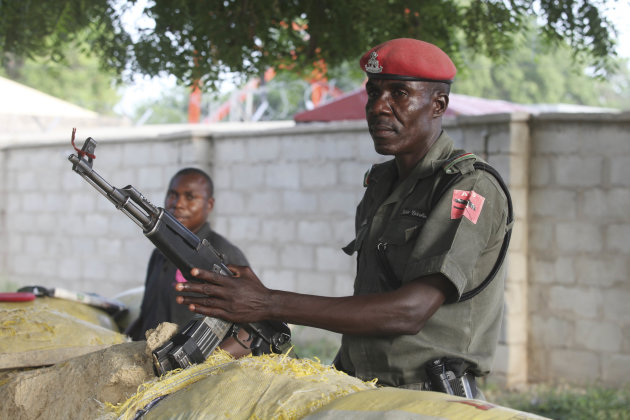At Least 67 Dead in North Nigeria Sect Attacks
By Jon Gambrell
Associated Press dispatch on Yahoo! News, November 5, 2011
"Residents fearfully left their homes Saturday to bury their dead in northeast Nigeria following a series of coordinated attacks that killed at least 67 people and left a new police headquarters in ruins, government offices burned and symbols of state power destroyed. A radical Muslim sect known locally as Boko Haram claimed responsibility for the attacks in Borno and Yobe states, with the worst damage done in and around the city of Damaturu. The group also promised to continue its bloody sectarian fight against Nigeria's weak central government, with residents nervously moving through empty streets, waiting for the next attack. 'There's that fear that something might possibly happen again,' Nigerian Red Cross official Ibrahim Bulama said. In Damaturu, the capital of Yobe state, a car bomb exploded Friday afternoon outside a three-story building used as a military office and barracks, killing many uniformed security agents, Bulama said. Gunmen then went through the town, blowing up a bank and attacking at least three police stations and some churches, leaving them in rubble, he said. Gunfire continued through the night and gunmen raided the village of Potiskum near the capital as well, witnesses said, leaving at least two people dead there.
On Saturday morning, people began hesitantly leaving their homes, seeing the destruction left behind which included military and police vehicles burned by the gunmen with the burned corpses of the drivers who died still in their seats. Bulama spoke to The Associated Press by telephone Saturday morning from a common Muslim burial ground in the city as his family buried a relative and friend, a police officer who died after suffering a gunshot wound to the head in the fighting. Officials anticipated a dusk-till-dawn curfew to fall over the town, though state officials repeatedly declined to comment on the violence. The violence destroyed federal offices, public buildings and an immigration office, said Aliyu Baffale Sambo, an official with Nigeria's National Emergency Management Agency. Bulama said Nigerian Red Cross statistics showed at least 63 people died in and around Damaturu. Sambo said government estimates suggested as many as 70 people could be dead there. The attacks around Damaturu came after four separate bombings struck Maiduguri, about 80 miles (130 kilometers) east. One blast detonated around noon outside an Islamic college. Another bombing alongside a road in Maiduguri killed four people, local police commissioner Simeon Midenda said. A short time later, suicide bombers driving a black SUV detonated their explosives outside the base for the military unit charged with protecting the city from Boko Haram fighters, military spokesman Lt. Col. Hassan Ifijeh Mohammed said. That blast injured several soldiers. A Boko Haram spokesman claimed responsibility for the attacks in an interview Saturday with The Daily Trust, the newspaper of record across Nigeria's Muslim north. A Boko Haram spokesman using the nom de guerre Abul-Qaqa promised that 'more attacks are on the way.' 'We will continue attacking federal government formations until security forces stop their excesses on our members and vulnerable civilians,' the spokesman said. His comments come as human rights activists say soldiers have beaten and killed civilians while trying to search for the sect in Maiduguri. Boko Haram wants to implement strict Shariah law across Nigeria, an oil-rich nation of more than 160 million which has a predominantly Christian south and a Muslim north. Its name means 'Western education is sacrilige [sic]' in the local Hausa language, but instead of schooling, it rejects Western ideals like Nigeria's US-styled democracy that followers believe have destroyed the country with corrupt politicians. Boko Haram's attacks occurred ahead of Eid al-Adha, or the feast of sacrifice, when Muslims around the world slaughter sheep and cattle in remembrance of Abraham's near-sacrifice of his son. Police elsewhere in the country had warned of violence ahead of the celebration in Nigeria, a country largely split between a Christian south and a Muslim north. On Wednesday, police in Maiduguri had said they broke up a plot to bomb the city over the holiday. [...]"
Saturday, November 05, 2011
Subscribe to:
Post Comments (Atom)















No comments:
Post a Comment
Please be constructive in your comments. - AJ